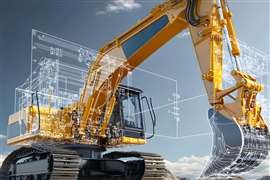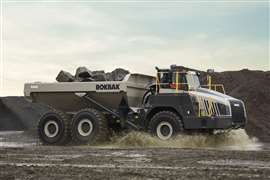Interview: Gaz Group's Natalia Alexeeva talks to International Construction
30 July 2008

Established in 2005 following the restructuring of state-controlled automotive manufacturer RusPromAuto, but virtually unknown outside its home market, Russia's Gaz Group is now the largest domestic manufacturer of construction equipment in the country. Richard High reports.
Quickly establishing itself as Russia's largest automotive manufacturer, GAZ Group, which is divided into seven divisions - Construction Equipment, Bus, Light Commercial Vehicle (LCV), Passenger Car, Truck, Powertrain and Automotive Components - had revenues of US$ 6.2 billion in 2007.
The Construction Division currently manufactures asphalt pavers, dozers, wheeled loaders, tracked and wheeled excavators, material handlers with elevated cabs, graders and milling machines, and had revenues of US$ 600 million in 2007.
"We're not the biggest Division in the group," said director of strategical development and investment, Natalia Alexeeva. "But we are the most quickly growing Division. Turnover is up year-on-year (about +40% in 2007), and we also have the highest margins."
In 2007 the company saw sales grow dramatically with excavators (+45 %), wheeled loaders (+75 %) and graders (+29%) showing the most significant growth. Total unit sales rose by +28%, while profits rose +48%.
Speaking to iC at Moscow's CTT Show earlier this year, Ms Alexeeva, said the Division's share of the Russian construction equipment market, which she estimates will be worth US$ 6.3 billion in 2008, is "substantial".
The market, said Ms Alexeeva, bought 4000 wheeled excavators, 7500 crawler excavators, 1500 wheeled loaders and 1400 graders last year. Gaz Group's share was 54%, 5%, 7% and 73% respectively, which equates to 2600, 500, 400 and 1500 units, she added.
In the first quarter of 2008 sales of excavators (wheeled and tracked), graders and wheeled loaders have already reached US$ 90 million, a rise of +80% on the same period of 2007.
Infrastructure spend
The company sells throughout Russia, the Ukraine, Belarus, Kazakhstan, Moldova, Uzbekistan, Turkmenistan, Latvia and Lithuania, Serbia, Bulgaria, Afghanistan and Iran. Russia, where Ms Alexeeva, estimates it has a 64% market share, is its most important market.
The Russian government's recent announcement that it will spend US$ 570 billion on infrastructure spread over seven years, means the company is well placed to increase its share of the market, while expanding its presence abroad too, said Ms Alexeeva.
"If you go outside the major urban centers there are no roads, no buildings, no infrastructure to speak of. So this planned investment is good news for us," explained Ms Alexeeva.
But this planned investment also means more competition Ms Alexeeva told iC there were "many more" foreign companies coming to Russia and the CIS thanks to its booming economy and infrastructure investment plans.
At present the Wirtgen Group, Hyundai, Caterpiller, Volvo and Hitachi are its main competitors for road building equipment, excavators and wheeled loaders. While domestic manufacturers are challenging for a larger share of the grader market and Chinese companies "are becoming the biggest threat," said Ms Alexeeva.
While Chinese companies are "not necessarily cheaper", said Ms Alexeeva, they are "very aggressive" at sales and marketing. "They give higher margins to their dealers, 20 to 25%, whereas we give 15%, and are mainly attacking the wheeled loader segment," explained Ms Alexeeva.
In the excavator sector the most popular models are in the 24 and 26 tonne class, with high demand coming from quarrying and mining companies. "Quarrying and mining companies want quality, so they are willing to pay a higher price. The Chinese will therefore find it hard to get into this market," added Ms Alexeeva.
Consolidation
With so much infrastructure investment planned the company has been busy preparing itself by consolidating its dealer network, expanding its product line up and looking at future investment at home and abroad.
"We are actively changing our sales strategy and reconstructing our dealer network. In 2007 we had 87 dealers in Russia, now we have 48.
"However, this means we can concentrate our resources on supporting them and our after sales service. Over the last two years we've worked more closely with them, spent money together promoting our products at shows and customer days," said Ms Alexeeva.
New products were also thick on the ground at CTT, with the company showing new wheeled and tracked excavators (19 to 26 tonnes), alongside two new graders (18 and 25 tonnes), three new wheeled loaders (14.4 to 19 tonnes) and tracked versions of its ASF-K-3-02 and ASF-K-2-04 pavers.
As iC went to press the company had just launched a 40 tonne capacity truck crane, the URAL-6563, but Ms Alexeeva also promised a new, "massive" crawler crane. It should be seen in the iron early next year, "but at the moment we'd prefer to keep the exact details secret", she added.
The company is also looking to launch a new range of dozers. It has made several prototypes but lack of capacity at its manufacturing facilities meant the idea had to be shelved. However, Ms Alexeeva promised the machine would be available "soon".
Expansion
Outside its domestic market, the company has been investigating several options for expansion. It has plans to expand its dealer network into South Africa in 2009 and sometime later in the US. Ms Alexeeva told iC the company had also looked at China but, domestic manufacturer's prices are "too low" to be able to compete.
"Because of the effort needed to break into the market we also thought we'd loose focus on our main market. This means we won't be looking at India either," she added.
Besides this the company has other plans too. "We are looking at buying some smaller equipment manufacturers in Western Europe. We have a shopping list and we're going to be very aggressive in the market place.
"These new companies will add new technologies and more products to our line," said Ms Alexeeva, although she declined to say what those products might be, or where those companies it has in its sights are based.
While the rise in sales and the planned expansion might, to an outside observer, seem unstoppable, Ms Alexeeva concedes there are some obstacles in the way.
"While everyone in Russia knows our products and service reputation, we remain an unknown brand, that suffers from a lack of dealers and an after sales service network abroad," explained Ms Alexeeva.
There have been problems with retaining qualified workers and the rise in the cost of raw materials, such as steel, too, she added. But these don't seem to have dented Ms Alexeeva's confidence: "What drives me is making a success of the business, and I see plenty of opportunities to make that happen."




